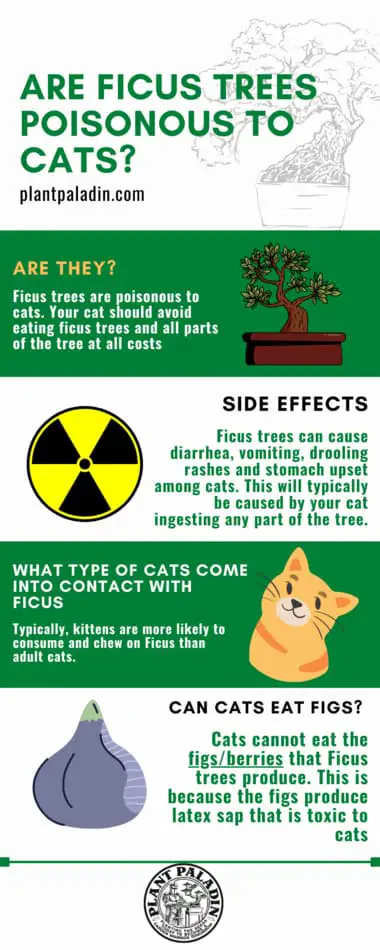This website is supported by its readers. If you click one of my links I may earn a commission. I am also a participant in the Amazon affiliates program and I will also earn a commission from qualified purchases.

One of the most popular indoor tropical tree species is the Ficus tree, or the Fig tree. With over 850 sub-species of Ficus, there is a good chance you or someone close to you has owned one of these. As such, the cross-over between Ficus owners and cat owners is large. This got me thinking: Are ficus trees poisonous to cats?
Ficus trees are poisonous to cats. If a cat comes into contact with or ingests a ficus, they can develop diarrhea, drooling, skin rashes, dermatitis, and vomiting. The sap will typically be most dangerous for Cats. Most of the 800+ species of fics will be toxic to cats.
So what should you do if your cat has eaten or come into contact with a Ficus tree? And how do you prevent your cat from going near a Ficus in the future? Keep reading to find out more!
Just a quick heads up, over the past three years of running Plantpaladin, hundreds of people have asked for product recommendations. As such, You can find my favorite indoor bonsai tree here (link takes you to Bonsaiboy), my favorite outdoor bonsai tree (link takes you to Bonsaiboy), or have a look at all the products I recommend here.
Are Ficus trees poisonous to cats?
So recently I’ve finally finished my house move and gone from a two-bedroom flat into a three-bedroom house with a garden.
As such, we have quite a few neighborhood cats that like to hang out in my garden near the conservatory where I keep my tree.
With me keeping my Ficus bonsai tree near the garden, the last thing I want is my Ficus to cause cats to fall ill.
As such, I contacted my local vet and my local botanical garden and read the studies on whether Ficus trees are poisonous to cats.
To summarize:
- Most of the 850 Ficus species globally are toxic to cats.
- The vast majority of the Ficus tree’s toxicity comes either from ingesting the sap that the leaves produce or by ingesting the leaves.
- If you have a Ficus tree that produces figs/berries, then the sap on these figs and berries will also be toxic.
- Most cases are from cats indoors near Ficus, commonly kept as an indoor plant.
- The main side effects of a cat ingesting Ficus include vomiting, diarrhea, dizziness, fatigue, drooling, and gastrointestinal discomfort.
- Rashes and skin irritation are also commonplace when cats do not ingest Ficus but rub up against it.
- Cats can also sometimes choke on the leaves and berries/figs that Ficus produces.
- Kittens will be more prone to eating and chewing on Ficus than grown cats.
Ficus toxicity – quick summary
To summarize, I’ve created a quick table highlighting ficus’ toxicity below:
Category | Explained |
Botanical Name | Ficus Spp |
Common Names | Ginseng, Rubber plant, rubber tree, common fig, fiddle-leaf fig, Chinese banyan, Creeping fig, Ficus Audrey |
Toxicity | Cats, dogs, and other mammals. |
Toxic parts | Sap, stems, and leaves. |
Severity | Moderate |
Toxic principle | Ficin/Ficusin Enzymes |
Are Ficus trees poisonous to cats: Studies
So, I didn’t just want to write up a post without any substantial scientific studies underpinning this post.
As such, I went through numerous studies investigating Ficus’s toxicity with cats.
Many of these studies (with a few exceptions) were geared to the toxicity of Ficus in humans.
The general findings of the studies then were:
With cats being much smaller, we know that any small toxicity to people will be amplified in cats, meaning that Ficus can be poisonous to cats.
To summarize:
ASPCA
The ASPCA highlights Ficus Benjamina/fig plants on their list of toxic plants/trees to cats.
The University of California Study
The University of California determines Ficus to have class four toxicity. This means Ficus can cause rashes and skin irritation in species such as Ficus Benjamina and Ficus Elastica.
Yaacob Ilyanie, Tin Wui Wong and Chee Yan Choo study
In their study published in the Journal of Complementary and Integrative Medicine, researchers found that Ficus had low levels of oral toxicity ( drooling, skin irritation) in mice if consumed.
Biomedicine and Pharmacotherapy study – May 2021
In volume 137 of the biomedicine and pharmacotherapy, a study found that Ficus tree leaves, if consumed in very high quantities, can be toxic ( skin irritation, vomiting)
This will be amplified with cats.
National library of medicine
A study by the National Library of Medicine found that whilst Ficus has some good medicinal properties for anti-inflammatory illnesses, its sap contains latex.
Cats are then allergic to the latex found in the sap of Ficus Benjamina.
What should you do if your cat has eaten a Ficus?
If you think your cat has consumed or come into contact with Ficus, take note of the tree’s sub-species and call up your local or emergency vet immediately. Avoid treating the cat yourself by getting the cat to throw up unless directly instructed to do so by a vet.
A few details that you should keep nearby if you own a do are as follows:
- Vets Now
- Pet Helpline (UK)
- Pet Poison Helpline ( 24hr USA)
- ASPCA Poison Center – 1-888-426-4435
Whilst for most cats, the main symptoms are typically mild and tend to subside in 24 to 48 hours, the more of the Ficus they have come into contact with/eaten, the more severe the side effects will be.
According to Dr. Callum Turner – Veterinarian at St.Davids:
“Weeping fig poisoning results in skin and oral irritation which can lead to gastrointestinal symptoms among other symptoms; you should rinse out the mouth thoroughly and the skin around the mouth. If other symptoms present or you’re concerned you should visit your Veterinarian to be on the safe side.” – Wagwalking.com
First aid if your cat has eaten a Ficus
In the immediate aftermath of noticing your cat has ingested or been afflicted with focus toxins, carefully remove the plant and its toxins from your cat in a safe space. Then, ensure you provide it with water.
Following this, don’t hesitate to contact a pet poison hotline.
Clinical signs of ficus toxicity in cats
So, when talking about the toxicity of ficus to cats, most scientific studies will usually measure this on a severity scale.
As such, the Univeristy of California has determined that Ficus trees have a class four toxicity for cats.
Dermatitis is the main symptom if your cat comes into contact with Ficus.
Any contact with this tree’s thorns, sap, or juice will cause your cat to develop skin rash or irritation.
We will talk more about how to resolve this going forward, but as a quick response, washing the area out with soap and water is vital as quickly as possible.
If ingested, this can lead to an upset stomach, vomiting, and diarrhea.
Are all ficus trees toxic to cats?
Most of the 800+ ficus species will be mild or moderately toxic to cats and other mammals. As such, ensure they are kept out of reach of your pets.
Now, with the vast majority of ficus species out there, it can be hard to know if your specific tree is toxic.
As such, I’ve compiled a quick list below highlighting some of the key species:
- Ficus benjamina (Weeping Fig)
- Ficus lyrata (Fiddle-Leaf Fig)
- Ficus elastica (Rubber Plant)
- Ficus microcarpa (Indian Laurel)
- Ficus retusa (Ginseng Fig)
- Ficus pumila (Creeping Fig)
- Ficus carica (Common Fig)
- Ficus citrifolia (Shortleaf Fig)
- Ficus aspera (Clown Fig)
- Ficus maclellandii (Alii Fig)
- Ficus salicaria (Narrowleaf Fig)
- Ficus septica (Septic Fig)
- Ficus deltoidea (Mistletoe Fig)
- Ficus concinna (Chinese Banyan)
- Ficus racemosa (Cluster Fig)
- Ficus auriculata (Roxburgh Fig)
- Ficus benjamina var. Starlight (Starlight Weeping Fig)
- Ficus lyrata var. bambino (Bambino Fiddle-Leaf Fig)
- Ficus benjamina var. Danielle (Danielle Weeping Fig)
- Ficus elastica var. Tineke (Tineke Rubber Plant)
- Ficus microcarpa var. nitida (Indian Laurel Nitida)
- Ficus carica ‘Brown Turkey’ (Brown Turkey Fig)
- Ficus citrifolia var. silvestris (Florida Shortleaf Fig)
- Ficus retusa var. nitida (Ginseng Fig Nitida)
- Ficus macrophylla (Moreton Bay Fig)
What part of the Ficus is poisonous to cats?
The main reason why Ficus is toxic to cats is due to the sap it produces.
Ficus/fig trees often produce sap when working or training/wiring them, which is common in bonsai tree keeping.
This sap contains latex, which is toxic to cats. It’s one of the reasons why it’s best to keep latex gloves and other products away from cats.
This sap typically runs through all tree parts, including the branches, roots, leaves, and trunk.
This means that even if your cat does not ingest the Ficus tree and rubs up against it, it can also get poisoned by the tree.
What happens if your cat eats Ficus?
If your cat eats a Ficus tree, it will suffer mild to severe side effects depending on the severity of contact/ingestion of the tree.
The main side effects include:
- Vomiting – Your cat’s natural defense will be to try to throw up the toxins if it has consumed the tree
- Dihorrea – Similar to above, your cat will try to remove the toxins from its system as quickly as possible
- Skin irritation/Rashes – Common if your cat rubs up against the tree but does not eat it, typically on a cat’s face.
- Drooling – This occurs if your cat has eaten the Ficus leaves.
- Gastrointestinal discomfort – if ingested, Ficus can cause gastrointestinal discomfort as your cat’s stomach tries to mitigate the damage caused by Ficus.
- Anorexia – Eating Ficus that causes distress to your cat can stop it from wanting to eat for a prolonged period. This can cause it to lose weight and become anorexic.
Whilst most cats will get a mild side effect from eating Ficus, it is still important that you call up your vet as soon as possible if you think this is the case.
The main symptoms of ficus toxicity in cats include vomiting, diarrhea, skin irritation, drooling, Skin irritation/rashes, and gastrointestinal discomfort.
How to prevent your cat from eating Ficus
To prevent your cat from eating toxic Ficus, there are a few steps you can follow, including:
Invest in a less toxic species
If you know you have an adventure cat who likes to run around and touch everything in your house, consider getting rid of your Ficus and investing in tree species that are non-toxic to them.
Juniper, for example, can make for good species (just be aware that your cat might choke on some of the small, needle-like leaves/tips)
Keep your Ficus in a cage
Cats are excellent climbers and get everywhere.
Even if you keep your Ficus high and out of reach, trust me when I say your cat will get to it!
That being said, one option that works well is keeping your bonsai tree in a cage.
Cages are typically used to prevent birds, squirrels, and other animals from attacking outdoor trees.
Doing this on an indoor tree like Ficus will stop your cats from touching the leaves and chewing on the branches.
Keep your Ficus in a separate room.
You likely have a room in your house that your cat does not frequent as much as other rooms.
An example is a loft or space your cat can’t enter.
Keeping your Ficus in a separate room from your cat will stop it from being cruse and wanting to explore what the tree is.
Water when your cat is away
Cats love being the center of attention…when your attention is elsewhere.
As such, when you give your Ficus attention by watering them, it’s not uncommon that your cat decides to jump on and rub itself up against your Ficus.
As such, when pruning, wiring, training, or just watering your Ficus, ensure you move your cat into another room or keep your cat in a carrier while you do.
What type of cats come into contact with Ficus?
Typically, kittens are more likely to consume and chew on Ficus than adult cats. Other cat species that are more curious in temperament will also frequently ingest Ficus, such as Maine-Coons
Can cats eat figs?
Cats cannot eat the figs/berries that Ficus trees produce. This is because the figs produce latex sap that is toxic to cats. Call your vet if your cat has eaten figs.
Ficus seeds are also toxic and should not be eaten by cats.
Is Ficus bonsai toxic to cats?
As ficus bonsai, such as Ginseng bonsai, originated from ficus trees, these too will be toxic to cats. Ensure that they are kept away from your cat to keep them protected.
Are Ficus trees toxic to dogs?
Ficus trees are poisonous to dogs. Ficus trees can cause diarrhea, vomiting, drooling rashes, and stomach upset among dogs. This is typically caused by your dog ingesting any part of the tree, especially the sap.
What indoor plants are not toxic to cats?
Fukien tea, Olive, Iron tree, Parlour Palm, and Ladypalm are all indoor trees that are safe to keep around cats. These will cause only mild irritation to cats if ingested in large quantities.
To read more about Olive, check out my post here.
Hopefully, the post today has helped answer whether Ficus trees are poisonous to cats
Alternatively, I’d consider reading up on my post about indoor trees and trees that are toxic to the following animals:
You can also read up on whether bonsai trees are toxic to people here.
My top picks for the gear you will need!
So like I mentioned earlier, over the past three years of running PlantPaladin, hundreds of people have asked me for my recommendations on the best bonsai gear on the market.
Having spent thousands of dollars on bonsai items these past few years and tested at least 100 bonsai-specific products, I’ve listed my favorite products below – All of which I highly recommend and think you can get great value.
They can purchase directly by clicking the link to take them to Amazon.
Bonsai Tool Set: One of the significant challenges I’ve had is finding a toolset that was not only durable but didn’t break the bank. SOLIGT has recently developed a fantastic bonsai tool set that covers all the tools you need to trim, prune, and repot your trees. – You can grab it here.
Complete Bonsai Set: Many of you will want to grow your bonsai trees entirely from scratch, but finding the varicose seeds, pots, and other items in one place can be challenging. Leaves and Sole then have created a complete bonsai set that I’ve personally used that ticks all the boxes. You can grab it here.
Bonsai wire: The number of times I’ve run out of wire for my bonsai or purchased cheap bonsai wire that doesn’t do the job is embarrassing for me to admit. After a lot of trial and error, I found that using Hotop’s aluminum bonsai wire is one of the best options on the market. This can easily be used for both indoor and outdoor bonsai. You can grab it here.
This post was written by Fehed Nicass who has been passionate about bonsai for over 3 years. He currently resides in the UK and works in sales.

